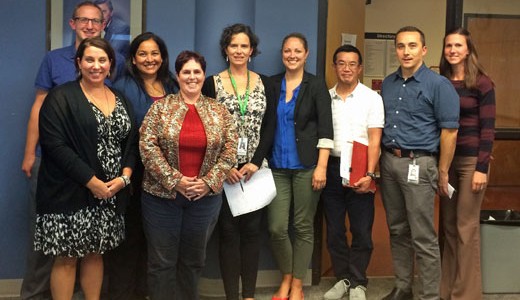A reality check for TCU team
“My mother always said that it was okay to complain,” says Lynedah Vartell. “But she always asked, ‘What is the next step?’”
Following her mother’s discharge from the Transitional Care Unit (TCU) at UBC Hospital, Lynedah filed a complaint with the Patient Care Quality Office. What happened next — an invitation to meet with the TCU team — came as a pleasant and welcome surprise.
“We pride ourselves in providing great care,” says Parm Pannun, patient services manager of the TCU, “but we can all learn how to improve the patient experience by looking at things through the patient and family lens.”
A focus on quality
Invited to a TCU Quality Improvement meeting, Lynedah readily accepted. It was an opportunity to meet with the unit’s multidisciplinary team — including physicians and Residents — for an open and frank discussion about the challenges of navigating the health care system and incidents her and her mother experienced.
“With the focus on quality improvement — a common point of interest for all involved —meetings such as this are empowering, especially for patients and families,” says Tracey Taulu, operations director, UBC Hospital.
And, to be blunt says Parm, “It’s a reality check.”
Many ah-ha moments
Sitting down with more than 30 clinicians, Lynedah shared stories. She recounted the time she brought in her mother’s favourite meal —pizza — and needed to heat it up. Refused access to a microwave on the unit, she was directed to an elevator and the cafeteria. The result was a frustrating and time-consuming experience trying to navigate confusing hospital hallways and getting lost in a stairwell.
“This was one of many ah-ha moments,” says Parm. “We forget that our buildings are foreign places and our system can be complicated. Lynedah gave us the opportunity to reflect and learn.”
Lynedah also emphasized the importance of little things, like taking time to introduce ourselves, speaking English in the presence of patients, unless another language is appropriate, and conversing with family in private, quiet settings instead of on the run in busy hospital corridors.
One of the pivotal moments during the discussion was when Lynedah candidly noted that all her issues could be resolved at “zero cost.” She wasn’t asking for investments in better equipment or technology; all she sought were small investments in taking the time to care and be mindful in the process.
When asked to provide one key piece of advice to staff, she offered: “Be aware of your responsibility on a daily basis to have patients as your focus. This includes listening to the patient and their family.”
Hanan Davidson, a new graduate and TCU physiotherapist, agrees. “I think communication is paramount to a successful, patient-centred care approach on all levels,” he says. “I hope this meeting leads to an effective avenue where patients, families and health care professionals can have their concerns addressed.”
In her mother’s footsteps
Looking back, Lynedah is positive about her meeting with the TCU team. “Staff took my contributions seriously,” she explains. But true to her mother’s philosophy, she’s more interested about next steps.
Consistent with the expectations and responsibilities outlined for staff, patients and families in “Partners in Care”, the team and Lynedah came up with a list of no-cost or low-cost initiatives to enhance the patient and family experience. These solutions include installation of a team role navigation board on the unit. This board identifies the charge nurse for each shift, outlines all staff roles and responsibilities and reminds physicians to use meeting rooms for sensitive discussions.
Parm has set aside dedicated open office hours for patients and families to meet with her. “Ideally, if patients or families do have concerns, they should be able to raise them while still in hospital, so we can address the issue right there and then while the patient is on the unit.”
Other changes, like improved listening and generally being more aware of the patient and family perspectives are more subtle, and perhaps even more important.
And this is just the beginning for Lynedah. She’s agreed to become a member of the Regional Patient Care Quality Council to continue advocating for patient-centred care. Her ongoing commitment, and that of the TCU team, will help ensure a positive experience for other the patients and their families.


Carole Schmitz
Kudos to the TCU team in listening and hearing a patient/residents family concerns. My mom spent the last four weeks of her life in richmond hospital, 2nd floor. I had many good experiences and a lot of awful experiences. To know you have been heard and that your recommendations are taken seriously is so very important.